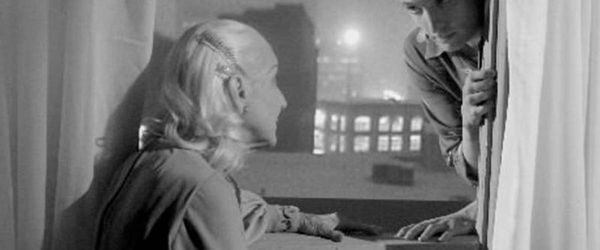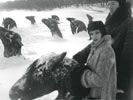Eye For Film >> Movies >> My Winnipeg (2007) Film Review
My Winnipeg
Reviewed by: Anton Bitel

Whether it is Nathaniel Kahn comparing Louis Kahn's talents as a world-renowned architect with his deficiencies as a father in My Architect: A Son's Journey (2003), or Jonathan Caouette subjecting himself to a narcissistic bombardment of video scrutiny (with his family as collateral damage) in Tarnation (2004), or Chris Waitt taking his own erectile dysfunction into hand in A Complete History Of My Sexual Failures (2008), or the likes of Michael Moore and Morgan Spurlock placing themselves firmly at the gravitational centre of their every investigative universe, these days one could be forgiven for supposing that the noughties documentary is all about me me me.
It is an impression which Guy Maddin's My Winnipeg may do little to dispel – but then, this mannered feature is so unlike any other documentary, or indeed unlike any film at all besides those previously made by Maddin, that its idiosyncratic approach to its geographical and personal subjects (both enshrined in the title) seems entirely appropriate. And unlike his predecessors in the documentary form, Maddin evinces a capacity to present himself (and everything else besides) with disarming irony.

At the film's beginning, Maddin himself - or at least Maddin as played by the actor Darcy Fehr - is shown half-asleep on a night train which he hopes will take him forever out of the city in which he was born and where he has spent his entire life. As Maddin struggles to keep his eyes open, and footage of snowy Winnipeg itself, and of Maddin's grotesquely outsized mother, are eerily rear-projected onto the train's cracked windows, it quickly becomes clear that this is to be no conventional travelogue through Manitoba's capital, but a fever dream on place, memory and the inescapability of the past.
The real Maddin does not so much narrate as intone his voice-over, repeating phrases as though mesmerising the viewer with some hypnotic spell, while intertitles subliminally throw back key words from the script so that they hover suggestively in new contexts. Maddin guides us on a somnambulist's tour through his city's potted history as well as his own, embellishing his patter with all manner of spurious hearsay details, or wholly invented fantasies.
Does Winnipeg really have "ten times the sleep-walking rate of any other city in the world"? Was its giant amusement park (named 'Happyland') really destroyed when the bellowing of homosexual bison started a stampede? Are vagrants really required by civic law to stay off the streets and live on the rooftops? Is it really illegal to discard any of Winnipeg's street signs? Has the city really been at the global epicentre of paranormal activity and ectoplasmic extractions? Was its Arlington Street Bridge really originally designed to span the Egyptian Nile, before being bought for a steal by "bargain-crazy Winnipeg"? Is demolition currently the city's only growth industry?
In fact, the answer to at least some of these questions is yes – and as for the others, what does it really matter in a town which was renamed Himmlerstadt in 1942 during an elaborately staged Nazi invasion (dubbed 'If Day') designed to terrify the population into buying war bonds? "In Winnipeg", as Maddin points out, "every day is If Day" - and co-existing alongside its historical realities there will always be deviant counterfactuals, born of escapist fantasy and bitter regret.
Interspersed amongst this potted psychic history are occasional filmed reconstructions by the director of crucial incidents from his childhood, with Maddin providing arch commentary on the proceedings. His mother, the focus of all his hyper-Freudian anxieties, is played by Ann Savage, once famed as the female lead of Edgar Ulmer's Detour (1945) - and here the actress, though not seen on screen since 1955, retains all the venom of a femme fatale, as she terrifies her young son (and his sister) with regular psychodramas concerning the dangers of rampant sensualism and 'girl delinquents'. "Everything that happens in this city is a euphemism," concedes Maddin, and so it is that he too has come to see sexual possibility in every curve, contour or backstreet on the city's map (on which visions of female flesh are often surreally superimposed).
And so, combining the flickering black and white of his trademark expressionism (what better cinematic signifier of memories both formative and all but lost?) with archival footage, dramatic reconstructions, photomontages, animation, and even the odd appearance of colour (eg the director urinating one last time in the hockey arena of his youth before it is razed to the ground), Maddin has concocted his own urban myth - an oddball chronicle that re-maps his city's darkest back-lanes and by-ways as a repository for a lost innocence that neither he nor his fellow Winnipegers can ever fully recover, nor ever truly escape. It is one man's quirky, hilarious, and ultimately moving examination of where he has come from, and what he has lost along the way.
Maddin fans will need no persuading to see this film – but for those who have never heard of the director, or even of Winnipeg, and who perhaps harbour the misguided notion that all documentaries follow essentially the same formula, My Winnipeg makes for essential viewing. So, all aboard!
Reviewed on: 24 Jun 2008
















